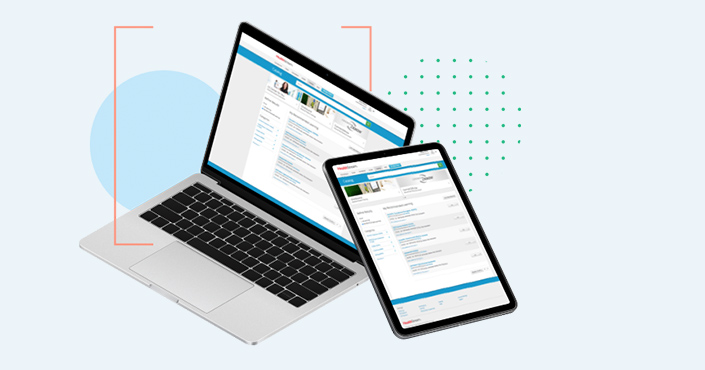blog


In our fast-evolving world, learning and performance management systems play a pivotal role. Nowhere is this more critical than in the dynamic healthcare sector, where top-notch patient care, regulatory compliance, and adapting to industry shifts are imperative.
A recent study by HealthStream highlights essential features of healthcare-specific Learning Management Systems (LMS) that are vital for HR leaders and professionals in healthcare. For example, access to an ecosystem of healthcare content, integration with Electronic Health Records (EHRs), and tracking of healthcare-specific skills and competencies are mentioned.
The surveyed HR leaders showed that users of Learning or Performance Management Systems place highest value on tracking and analyzing employee performance. At the most basic level, they want to be able to track each employees’ compliance with continuing education and licensure requirements. Additionally, they expect their system to have good reporting and analytic tools to support their executive decision-making.
When asked about new functionality for their Learning or Performance Management System, HR leaders mention better training for new users/administrators and more information about what their compliance obligations are and whether or not their organization is in compliance.
A healthcare-specific LMS can bring many valuable benefits with industry-specific features. For more information about HealthStream’s Learning Center, click here.
In March of 2023, HealthStream interviewed a group of HR leaders. Respondents were asked to rate the importance of various features that might be included in a Learning or Performance Management System and to indicate the importance they placed on having healthcare-specific content in these systems. The following graphics offer a snapshot of the key findings from this illuminating study:
Based on the ratings, the feature noted as most important is:
The least important feature is:
The following table shows the rating of each of the features, from most important to least important.
Q. Rate the following features on a scale of 1 being most important and 10 being least important. | |
| Mean Score |
3.33 | |
Reporting and analytics: includes features that enable tracking of user progress, course completion rates, and learner performance | 4.50 |
Access to an ecosystem of healthcare specific applications and content | 4.50 |
Integration with other systems such as HRIS, EHRs and other tools | 4.58 |
Competency tracking: track employees’ competencies to ensure they have the necessary skills to perform their job duties | 4.67 |
Mobile Native designed to enable employees to access content and applications on their mobile device | 5.67 |
Role-based access control: restrict access to certain features or content based on job role content or seniority | 6.17 |
Virtual simulation: practice procedures and treatments in a safe and controlled environment | 6.50 |
Gamification such as badges, rewards, and leaderboards to increase learner engagement and motivation | 7.08 |
Patient education: enable healthcare professionals to create and distribute patient education | 8.00 |
Eight of the 12 HR leaders interviewed (67%) strongly agree that healthcare-specific functionality is important when choosing a Learning or Performance Management System.
Q. When considering a Learning or Performance Management System, healthcare-specific functionality is a top consideration in the decision-making process.
| Number of Respondents | Percentage of Respondents |
Strongly Agree | 8 | 66.7% |
Agree | 3 | 25.0 |
Disagree | 0 | 0.0 |
Strongly Disagree | 1 | 8.3 |
TOTAL | 12 | 100% |
When asked to name additional healthcare-specific features or functionality they would like to see in an LMS, Performance Management, or similar application, the responses indicated a wide variety of needs, making it all the more important to understand included features when choosing a new LMS:
HealthStream’s learning management system and healthcare training solutions support medical training initiatives and allow for the best patient care.
View All Learning & PerformanceExpand the decision-making skills and effectiveness of your healthcare workforce with HealthStream's workforce development programs and services.
View All Clinical DevelopmentComprehensive, industry-leading provider onboarding and credentialing software that validates health outcomes and supports provider assessment.
View All CredentialingMake sure your healthcare staff can schedule out appointments and work schedules with ease using our line of nurse scheduling software solutions.
View All SchedulingWhen you enact HealthStream's quality compliance solutions, you can do so with the confidence your healthcare organization will meet all standards of care.
View All Quality & ComplianceStop wasting money on RCM issues. Learn how to Provide your team with expert-led revenue cycle training to help them reduce denied claims, reimbursement mistakes, and more.
View All Revenue Cycle EducationLearn about our advanced resuscitation training solutions. Our solutions are designed to help improve patient outcomes.
View All Resuscitation